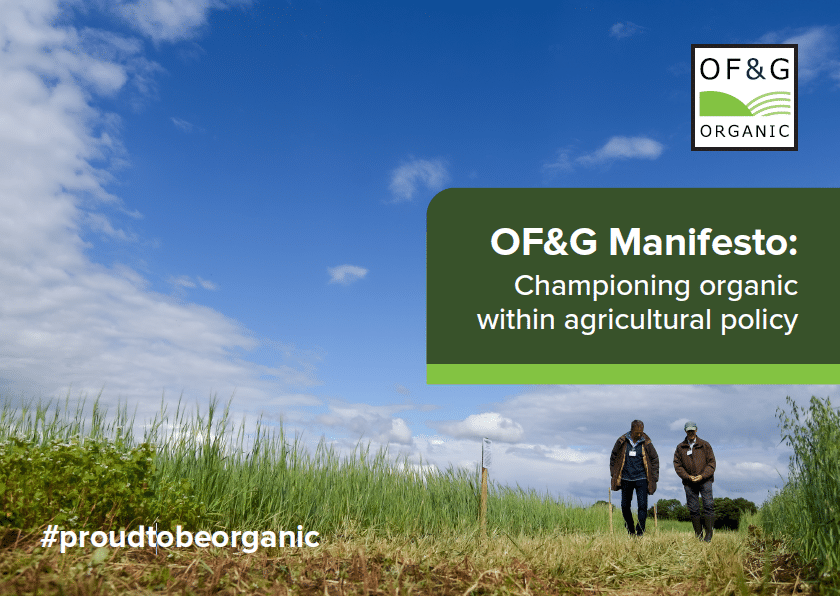Organic Farmers & Growers (OF&G) has published its manifesto, Championing organic within agricultural policy, aimed at highlighting the ‘key advantages of the organic approach in response to the unprecedented transitional upheaval in the farming sector’.
Roger Kerr, chief executive of the organic land certifier, says that terms such as ‘regenerative’ and ‘agroecological’ – which ‘lack legally defined, whole-system standards’ – are creating increasing confusion.
“We are asking that organic, with its proven ‘real world’ evidence of delivery, is given clear and unambiguous recognition,” says Kerr. “Policymakers must acknowledge organic’s potential to contribute positively to the challenges we all face, in alleviating the social and environmental impacts of our farming and food system.”
Time is running out for prudent decisions to be made within Defra
OF&G’s blueprint sets out the case for ‘why policymakers should consider organic’ and hopes to help farmers, food businesses and the consumers who buy into them to recognize the ‘multiple benefits organic delivers’.
 “Time is running out for prudent decisions to be made within Defra,” argues Kerr (pictured). “A lack of detail and continuing uncertainty is hampering the development of agricultural policy and regulation which, in turn, means farmers are unable to make long term plans.
“Time is running out for prudent decisions to be made within Defra,” argues Kerr (pictured). “A lack of detail and continuing uncertainty is hampering the development of agricultural policy and regulation which, in turn, means farmers are unable to make long term plans.
“OF&G has been lobbying continuously on behalf of our licensees to secure organic’s inclusion within future farming policy frameworks. Progress feels very slow when, in our opinion, the legal regulatory framework that already underpins organic farming, also offers a firm basis to help deliver on Defra’s stated aims for the provision of public goods in a substantive and cost-effective way.”
The new manifesto establishes ten core reasons why organic ‘deserves to be acknowledge’. It covers keys issues such as global recognition, transformative farming practices, carbon sequestration, food supply chain, biodiversity enhancements and market opportunities. The organically managed Cholderton Estate in Wiltshire is included as one of Defra’s ‘Tests and Trials’ case studies; Henry Edmunds, an organic farmer from Cholderton, confirms the positive Natural Capital opportunity, demonstrating many of the urgently needed ‘public goods’ which can be delivered through an organic systems-based approach to land management.
“The pressure on us all because … the climate and nature crises is enormous, there really is no time to waste and organic has proven its case as an effective solution over many decades,” says Edmunds. “The mixed farming enterprises we have at Cholderton are working and because we’re organic we’re able to run an economically and ecologically successful farming business producing high quality food alongside and in harmony with the natural landscape.”
There really is no time to waste and organic has proven its case as an effective solution over many decades
With decades of research supporting the positive impact of organic, Kerr believes the publication of OF&G’s manifesto ‘provides an opportunity to convey a concise and factual account of its advantages that will encourage wider recognition’.
“We felt it important to strip the manifesto back to the essential truths,” he explains. “OF&G is not suggesting every UK farm embrace organic conversion, but that a range of diverse approaches, including organic, will help protect our environment while delivering the resilience and adaptations necessary for UK farmers to continue to produce food in the face of the increasing climate volatility that we will see in the coming years.”
“Everyone has a vested interest in supporting more benign, sustainable practices to safeguard the future. Environmentally favourable farming practices are undergoing re-invention and rebranding, however organic provides the only clear, current and verified solution.”
The manifesto: ten reasons to believe
- Organic delivers transformation across all farming systems
- Organic is a solution to carbon sequestration
- Organic builds biodiversity
- Organic is agroecological and regenerative
- Organic ensures the integrity of our food
- Organic has high animal welfare
- Organic can be one of a range of farming systems
- Organic is the only globally recognized agroecology standard for food production
- Organic delivers a market demand
- Organic is an untapped opportunity











